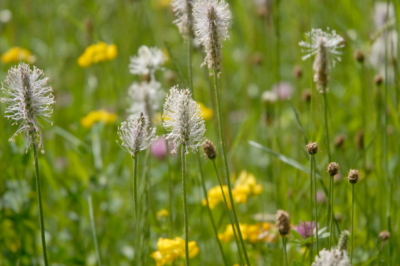Ribwort (Plantago lanceolata) has been a valued medicinal plant for centuries and can also be used in many recipes. In the lawn, however, the medicinal herb can quickly become a weed, as it can proliferate if treated incorrectly.

Control the ribwort plantain with weed killers.
In certain locations with the right soil conditions, ribwort plantain can proliferate greatly, with the plant being a valuable component in forage meadows for horses and rabbits. It is generally possible to control ribwort in garden lawns, along with other herbs and weeds, with herbicides. However, you should only use these chemical weed killers if alternative countermeasures have been fruitless and there are also no vegetable beds and fruit trees intended for consumption in the adjacent vicinity.
Control ribwort mechanically and thoughtfully
With the right strategy, you can also control sprawling stands of ribwort in the turf mechanically. First and foremost, stop the plants from self-seeding after the flowering period in summer. Mow your lawn regularly from spring onwards to a relatively low cutting height so that inflorescences cannot form in the first place. If you mow the faded ribwort only in summer, you will contribute to a further distribution of the seeds. If you cannot avoid this, you should at least use a catch basket for the grass cuttings when mowing and compost them far away from the lawn.
Weeding and processing ribwort by hand.
Weeding the individual plants by hand is tiring, but it also has a distinct advantage. You can harvest the plants fresh from the ground as needed and consume them in various forms:
- as tea from ribwort plantain
- as a natural medicine against cough and bronchial complaints
- as natural food for rabbits
- as an ingredient in salads and dressings
For the winter months, you can also preserve the ribwort in honey or dry it for preservation. The advantage of mechanically harvesting ribwort is that the deep-reaching roots are usually completely removed from the soil.
Tips & Tricks
Ribwort tends to be less common on calcareous soils, so lime applications can be part of the strategy for controlling ribwort in lawns.

